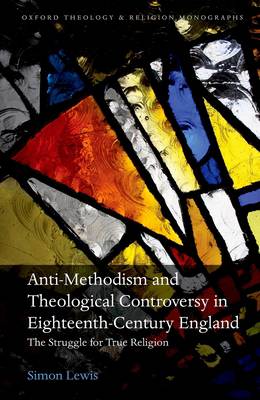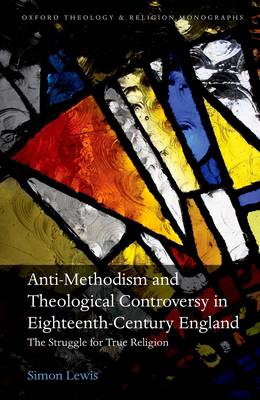
Bedankt voor het vertrouwen het afgelopen jaar! Om jou te bedanken bieden we GRATIS verzending (in België) aan op alles gedurende de hele maand januari.
- Afhalen na 1 uur in een winkel met voorraad
- Gratis thuislevering in België vanaf € 30
- Ruim aanbod met 7 miljoen producten
Bedankt voor het vertrouwen het afgelopen jaar! Om jou te bedanken bieden we GRATIS verzending (in België) aan op alles gedurende de hele maand januari.
- Afhalen na 1 uur in een winkel met voorraad
- Gratis thuislevering in België vanaf € 30
- Ruim aanbod met 7 miljoen producten
Zoeken
Anti-Methodism and Theological Controversy in Eighteenth-Century England
The Struggle for True Religion
Simon Lewis
€ 161,45
+ 322 punten
Omschrijving
John Wesley and George Whitefield are remembered as founders of Methodism, one of the most influential movements in the history of modern Christianity. Characterized by open-air and itinerant preaching, eighteenth-century Methodism was a divisive phenomenon, which attracted a torrent of printed opposition, especially from Anglican clergymen. Yet, most of these opponents have been virtually forgotten. Anti-Methodism and Theological Controversy in Eighteenth-Century England is the first large-scale examination of the theological ideas of early anti-Methodist authors. By illuminating a very different perspective on Methodism, Simon Lewis provides a fundamental reappraisal of the eighteenth-century Church of England and its doctrinal priorities. For anti-Methodist authors, attacking Wesley and Whitefield was part of a wider defence of 'true religion', which demonstrates the theological vitality of the much-derided Georgian Church. This book, therefore, places Methodism firmly in its contemporary theological context, as part of the Church of England's continuing struggle to define itself theologically.
Specificaties
Betrokkenen
- Auteur(s):
- Uitgeverij:
Inhoud
- Aantal bladzijden:
- 224
- Taal:
- Engels
- Reeks:
Eigenschappen
- Productcode (EAN):
- 9780192855756
- Verschijningsdatum:
- 28/03/2022
- Uitvoering:
- Hardcover
- Formaat:
- Genaaid
- Afmetingen:
- 164 mm x 237 mm
- Gewicht:
- 485 g

Alleen bij Standaard Boekhandel
+ 322 punten op je klantenkaart van Standaard Boekhandel
Beoordelingen
We publiceren alleen reviews die voldoen aan de voorwaarden voor reviews. Bekijk onze voorwaarden voor reviews.









